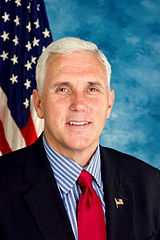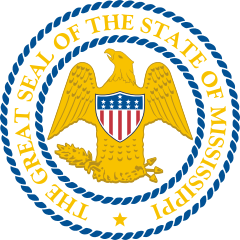November 7, 2018 •
Tennessee Elects Bill Lee Governor
The people of Tennessee voted to elect Republican Bill Lee as governor, defeating Democrat Karl Dean. 26 Independents also ran for governor, each receiving 0.2 percent or less of the vote. Many of the Independents were part of the Libertarian […]
The people of Tennessee voted to elect Republican Bill Lee as governor, defeating Democrat Karl Dean.
26 Independents also ran for governor, each receiving 0.2 percent or less of the vote.
Many of the Independents were part of the Libertarian Party, which placed 15 candidates on the ballot to protest Tennessee law which has fewer restrictions on Independent candidates being added to the ballot.
Lee has worked for his family’s construction business, the Lee Company, serving as CEO and Chairman prior to his candidacy. He also helps run the family’s Triple L Ranch.
Lee is native to Tennessee, continuing to live in Franklin.
July 18, 2016 •
Trump Selects Indiana Gov. Pence As Running Mate
Gov. Mike Pence is Donald Trump’s choice for vice president. Trump announced his running mate on July 15, 2016, via Twitter. Pence submitted his withdrawal for re-election after one term as the governor on July 15, 2016. The state GOP […]
 Gov. Mike Pence is Donald Trump’s choice for vice president.
Gov. Mike Pence is Donald Trump’s choice for vice president.
Trump announced his running mate on July 15, 2016, via Twitter. Pence submitted his withdrawal for re-election after one term as the governor on July 15, 2016.
The state GOP will meet on July 26 to vote on the party’s replacement gubernatorial candidate.
March 21, 2016 •
Primer: Contested Convention for the Republican Party
As the primaries wind down and the conventions draw closer, there is more and more discussion of the Republican convention being contested. But what is a contested convention? How does the Republican Party handle such an event? And what does […]
 As the primaries wind down and the conventions draw closer, there is more and more discussion of the Republican convention being contested. But what is a contested convention? How does the Republican Party handle such an event? And what does it mean for the eventual nominee?
As the primaries wind down and the conventions draw closer, there is more and more discussion of the Republican convention being contested. But what is a contested convention? How does the Republican Party handle such an event? And what does it mean for the eventual nominee?
The Pew Research Center describes a contested convention occurring “when no candidate has amassed the majority of delegate votes needed to win his or her party’s nomination in advance of the convention. A candidate still might gather the delegates needed by the time balloting begins, in which case the nomination is settled on the first ballot. But should the first ballot not produce a nominee, most delegates become free to vote for whomever they wish, leading potentially to multiple ballots.”
Since the adoption of the modern primary system in the early 1970s, most presidential conventions have not been contested as one candidate usually won enough delegates to enter the convention as the presumptive nominee. But this year there is a possibility no Republican candidate will have the majority of delegates when the convention begins.
Under the rules of the Republican National Convention, “each candidate for nomination for President … shall demonstrate the support of a majority of the delegates from each of eight or more states” (including territories) before he or she is able to be on the convention’s first ballot. The balloting process ends when one candidate receives the majority of delegate votes. This year there are 2,472 delegates, so to secure the Republican nomination a candidate will need 1,237—one more vote than 50 percent. Simply having a plurality of delegates is not enough to become the Republican nominee.
Entering the convention, each candidate who ran in the primaries will have a dedicated number of delegates from each state based on his or her performance in that state. Candidates who fail to have the support of enough states or who dropped out will not be able to be on the first ballot.
For the first ballot, the majority of delegates are bound to a specific candidate based on the performance of the candidate in the delegate’s state due to convention rules and, in some cases, state law. Some states assign delegates based on percentage of votes won in the primary, while others are “winner take all.” About 5 percent of the delegates come to the convention free to vote for who they want. These delegates, which include state party leaders and delegates from states or territories electing to not hold a primary, are able to vote their preference on the first ballot. Delegates who were bound to candidates who do not appear on the first ballot may also become unbound for the first ballot.
If no candidate receives a majority vote on the first ballot, the second and subsequent ballots are open to all who wish to put forth their names. Delegates are progressively unbound until all of them are free to vote their personal preference. The balloting will continue until a nominee is chosen. But the more ballots that occur, the less likely the nominee will win in November.
A Pew Research Center study looking at presidential elections since the Civil War found that only seven candidates coming out of contested conventions with multiple ballots were elected president. However, four of those seven candidates had opponents who had also been elected through a contested convention requiring multiple ballots. The last time this occurred was in 1920 when Warren Harding, who required 10 ballots to secure the nomination, beat James Cox, who required 44 ballots to secure his nomination.
The last president to be elected after a contested convention and face a candidate from an uncontested convention was Franklin Roosevelt in 1932. Adlai Stevenson was the last candidate to require multiple ballots to win the party nomination.
Sources:
Call of the 2016 Republican National Convention, Republican National Committee, 11/30/15
Contested presidential conventions, and why parties try to avoid them, Drew DeSilver, Pew Research Center, 2/4/16
The Democratic Convention of 1924, Digital History (archived page)
An Extremely Detailed Guide to What the Heck Might Happen at a GOP Contested Convention, Josh Voorhees, Slate Magazine, 3/10/16
December 30, 2014 •
South Carolina Ethics Commission General Counsel Resigning
The State Ethics Commission is losing an influential attorney who was recently silenced by the commission’s director. Attorney Cathy Hazelwood said she will leave the commission after 15 years of service to work at the Department of Education under Republican […]
The State Ethics Commission is losing an influential attorney who was recently silenced by the commission’s director.
Attorney Cathy Hazelwood said she will leave the commission after 15 years of service to work at the Department of Education under Republican Superintendent-elect Molly Spearman. Hazelwood was a go-to source for interpretation of ethics laws and media frequently sought her expertise when ethics complaints were filed against public officials.
Hazelwood was a go-to source for interpretation of ethics laws and media frequently sought her expertise when ethics complaints were filed against public officials.
However, the commission recently created a policy to channel all media inquiries to the director, Herb Hayden.
The policy came close to a year after Hazelwood publically disagreed with Hayden over how to handle an ethics case involving Governor Nikki Haley.
The commission is advertising for a new attorney to fill the position.
August 13, 2014 •
State Republican Parties Challenge SEC Pay-to-Play Rule
The Republican parties of New York and Tennessee have filed suit in U.S. District Court for the District of Columbia challenging Securities and Exchange Commission (SEC) Rule 206(4)-5. The plaintiffs allege the rule, which imposes restrictions upon investment advisors and […]
 The Republican parties of New York and Tennessee have filed suit in U.S. District Court for the District of Columbia challenging Securities and Exchange Commission (SEC) Rule 206(4)-5. The plaintiffs allege the rule, which imposes restrictions upon investment advisors and their covered associates making contributions to officials of state and local government entities, violates the freedom of speech protections of the First Amendment.
The Republican parties of New York and Tennessee have filed suit in U.S. District Court for the District of Columbia challenging Securities and Exchange Commission (SEC) Rule 206(4)-5. The plaintiffs allege the rule, which imposes restrictions upon investment advisors and their covered associates making contributions to officials of state and local government entities, violates the freedom of speech protections of the First Amendment.
The suit also takes the position that the SEC does not have the authority to regulate campaign contributions.
If struck down, the elimination of the rule would make it easier for any state governor making a run for president to raise money from the financial sector.
June 20, 2014 •
June 24 Runoff for Mississippi GOP Primary
A June 24 federal runoff has been scheduled for the Mississippi Republican Senate primary. Incumbent Sen. Thad Cochran and state Sen. Chris McDaniel will battle again in a tea party vs. establishment showdown. With 49 and 49.5 percent respectively, neither […]
 A June 24 federal runoff has been scheduled for the Mississippi Republican Senate primary. Incumbent Sen. Thad Cochran and state Sen. Chris McDaniel will battle again in a tea party vs. establishment showdown. With 49 and 49.5 percent respectively, neither candidate earned enough of the June 3 vote to secure the party nomination.
A June 24 federal runoff has been scheduled for the Mississippi Republican Senate primary. Incumbent Sen. Thad Cochran and state Sen. Chris McDaniel will battle again in a tea party vs. establishment showdown. With 49 and 49.5 percent respectively, neither candidate earned enough of the June 3 vote to secure the party nomination.
McDaniel, running on a platform of change, hopes to unseat the longtime incumbent. Cochran’s congressional tenure began in 1972; he then served three consecutive terms in the House and six consecutive terms in the Senate.
State and Federal Communications, Inc. provides research and consulting services for government relations professionals on lobbying laws, procurement lobbying laws, political contribution laws in the United States and Canada. Learn more by visiting stateandfed.com.

